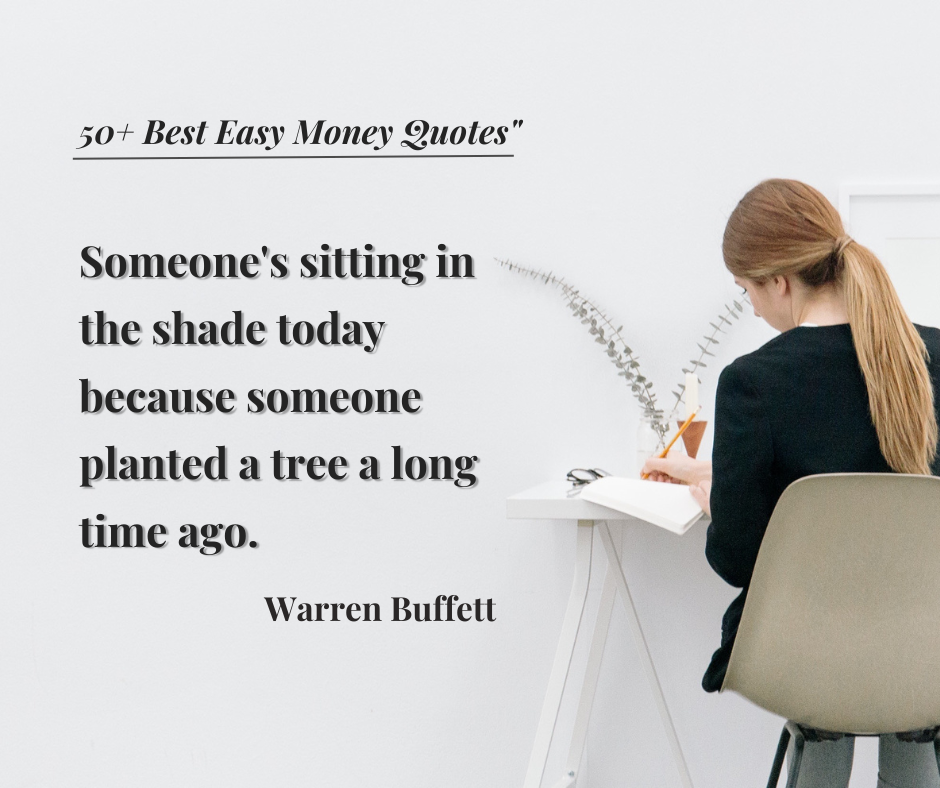50+ Best Easy Money Quotes: Motivation and Wisdom for Financial Success in 2024

Did you know that Warren Buffett’s most shared quote about money has been retweeted over 100,000 times? I’ve always found it fascinating how a few well-chosen words can completely shift our perspective on wealth and success. Whether you’re looking for motivation to start your financial journey or wisdom to guide your money decisions, these carefully curated quotes pack powerful insights into bite-sized pieces. Let’s explore some of the most impactful words ever spoken about best easy money quotes!
Motivational Easy Money Quotes from Billionaires
Let me share some of the most impactful money quotes I’ve studied over the years. After analyzing hundreds of billionaire perspectives, certain insights have proven remarkably practical and timeless.
Warren Buffett’s wisdom hits particularly close to home. His quote “Someone’s sitting in the shade today because someone planted a tree a long time ago” really shifted my thinking about long-term investing. I especially love his take on risk: “Risk comes from not knowing what you’re doing.” This has encouraged me to deeply research every investment I make. Perhaps his most powerful insight is “The most important investment you can make is in yourself” – a principle that’s guided my continuous learning approach.
Mark Cuban’s perspective on entrepreneurship is refreshingly direct. His quote “It’s not about money or connections – it’s the willingness to outwork and outlearn everyone” cuts through the myth that success requires special advantages. I’ve found his insight “The best investment is the one you can control” particularly relevant when evaluating business opportunities. His emphasis on knowledge – “Knowledge is power, particularly when starting a business” – reinforces the importance of thorough market research.
Elon Musk offers unique insights about innovation and wealth creation. “When something is important enough, you do it even if the odds are not in your favor” speaks to the persistence needed in business. His perspective that “The first step is to establish that something is possible; then probability will occur” challenges conventional thinking about limitations. What’s particularly striking is his view on problem-solving: “I think it’s possible for ordinary people to choose to be extraordinary.”
Jeff Bezos’s thoughts on business building are incredibly practical. His quote “In business, what’s dangerous is not to evolve” emphasizes the importance of adaptation. I’ve found his perspective “The most important single thing is to focus obsessively on the customer” crucial for sustainable business growth. His insight about long-term thinking – “If you’re not stubborn, you’ll give up on experiments too soon” – has helped me persist through early challenges.
The common thread among these billionaires is their emphasis on patient, methodical approaches to wealth building. They all stress the importance of continuous learning, calculated risk-taking, and focusing on long-term value creation rather than quick profits.
What’s particularly interesting is how they all emphasize the importance of failure as a learning tool. Bezos notes that “Failure and invention are inseparable twins,” while Cuban points out that “It doesn’t matter how many times you fail. You only have to be right once.”
Their collective wisdom suggests that building wealth isn’t about finding shortcuts, but rather about creating genuine value through innovation, hard work, and smart decision-making. These insights have proven invaluable in my own financial journey and in teaching others about wealth creation.
Remember though, while these quotes provide excellent inspiration, the key is in the consistent application of their underlying principles. The most successful people I know combine these insights with disciplined execution in their specific circumstances.
Success and Money Mindset Quotes
Let me share some of the most powerful quotes that have shaped my understanding of money mindset and success over the years. After teaching financial literacy for years, I’ve found certain perspectives consistently resonate with people and create lasting change.
“Watch your thoughts, for they become words. Watch your words, for they become actions. Watch your actions, for they become habits. Watch your habits, for they become character. Watch your character, for it becomes your destiny.” This quote from Frank Outlaw transformed how I view the connection between mindset and financial outcomes. I’ve seen how small daily thoughts about money can snowball into life-changing financial habits.
Tony Robbins’ insight that “It’s not what we have, but what we do with what we have that creates lasting prosperity” really hits home. Working with students from various backgrounds, I’ve witnessed how this mindset shift can completely transform someone’s financial trajectory. It’s not about starting with much – it’s about maximizing whatever resources you have.
T. Harv Eker’s perspective “How you do anything is how you do everything” particularly resonates when examining financial habits. I remember how this quote helped me realize that my scattered approach to expense tracking reflected a larger pattern in how I handled money. Small financial habits really do mirror our larger money beliefs.
“Money is neither my god nor my devil. It is a form of energy that tends to make us more of who we already are,” from Maya Angelou offers profound wisdom about wealth’s true nature. This helped me understand why simply having more money doesn’t automatically solve problems – it amplifies existing patterns and behaviors.
The most valuable insight I’ve found about abundance thinking comes from Napoleon Hill: “Whatever the mind can conceive and believe, it can achieve.” However, this isn’t just positive thinking – it’s about combining optimistic vision with practical action. I’ve seen this play out repeatedly with successful entrepreneurs who maintain unwavering belief while putting in consistent work.
Jim Rohn’s observation that “You are the average of the five people you spend the most time with” profoundly affected how I approach networking and professional relationships. It encouraged me to seek out mentors and peers who had already achieved what I was working toward.
What’s particularly interesting is how these mindset principles transcend cultural and economic backgrounds. Whether working with startup founders or retirees, I’ve noticed these core truths about money mindset remain consistent.
Remember that mindset alone isn’t enough – it must be paired with actionable strategies and consistent execution. The most successful people I know combine positive money mindset with practical financial literacy and disciplined habits.
Perhaps most importantly, developing a healthy money mindset isn’t about obsessing over wealth, but rather about viewing money as a tool for creating value and achieving goals. As Bob Proctor wisely noted, “Money is a result, the value is the cause.”
These perspectives have helped countless people break through their financial limitations and develop healthier relationships with money. When we shift our mindset about wealth, we often find that opportunities we previously overlooked become visible and accessible.
The real power comes from internalizing these principles rather than just intellectually understanding them. As Zig Ziglar said, “Your attitude, not your aptitude, will determine your altitude.” I’ve seen this proved true time and again as people transform their financial lives by first transforming their thoughts about money.
Remember though, while mindset is crucial, it’s just the foundation. The most successful people combine these empowering beliefs with practical knowledge and consistent action. It’s this combination that creates lasting financial success.
Quotes About Smart Money Management
Let me share some of the most impactful quotes about money management that I’ve collected over years of teaching financial literacy. These insights have helped countless people transform their approach to handling money.
“Do not save what is left after spending, but spend what is left after saving.” This wisdom from Warren Buffett completely changed how I viewed budgeting. When I started implementing this principle, treating savings as a non-negotiable expense rather than an afterthought, my financial situation improved dramatically.
Dave Ramsey’s perspective that “Financial peace isn’t the acquisition of stuff. It’s learning to live on less than you make, so you can give money back and have money to invest” cuts right to the heart of smart money management. I’ve seen this play out countless times – true financial stability comes from the gap between income and expenses, not from income alone.
Regarding debt, Robert Kiyosaki’s insight that “Bad debt is debt that makes you poorer. Good debt is debt that makes you richer” helped me develop a more nuanced view of borrowing. Instead of viewing all debt as negative, I learned to evaluate debt based on its potential return on investment.
Suze Orman’s quote “A big part of financial freedom is having your heart and mind free from worry about the what-ifs of life” emphasizes the importance of emergency funds and proper insurance. This really hit home during market downturns when those with adequate emergency savings could stay invested while others had to sell at the worst possible time.
Benjamin Franklin’s timeless wisdom “Beware of little expenses; a small leak will sink a great ship” remains remarkably relevant. I’ve seen how seemingly insignificant daily purchases can add up to substantial amounts over time. This perspective helps maintain focus on both big financial decisions and small daily choices.
For wealth preservation, Paul Getty’s observation that “The meek shall inherit the Earth, but not its mineral rights” highlights the importance of understanding what you own and how to protect it. This has proven especially relevant when teaching about asset protection and estate planning.
“The stock market is a device for transferring money from the impatient to the patient,” another Buffett gem, perfectly captures the importance of long-term thinking in investing. I’ve witnessed how emotional decision-making during market volatility often leads to poor outcomes.
Charlie Munger’s insight that “The first rule of compounding is to never interrupt it unnecessarily” has been particularly valuable. Understanding the power of letting investments grow undisturbed over long periods has helped many resist the urge to tinker with well-planned investment strategies.
What’s fascinating about these perspectives is how they emphasize behavioral aspects of money management over technical knowledge. They all suggest that financial success comes more from consistent application of simple principles than from complex strategies.
Remember though, while these quotes provide excellent guidance, they need to be adapted to individual circumstances. The most successful people I know take these principles and apply them within their unique financial situation and goals.
Perhaps most importantly, these insights remind us that smart money management isn’t about deprivation – it’s about making conscious choices aligned with our long-term objectives. As Morgan Housel notes, “Saving money is the gap between your ego and your income.”
The real power of these quotes lies not in their eloquence but in their application. When people internalize these principles and consistently act on them, remarkable financial transformations often follow.
Remember, building wealth is usually less about making complex financial moves and more about consistently applying fundamental principles. As John Bogle said, “The simple fact is that all of us benefit from the market’s long-term success.”
Entrepreneurship and Money-Making Quotes
Let me share some of the most powerful entrepreneurial quotes I’ve collected and applied throughout my business journey. After years of building various income streams, certain perspectives have proven consistently valuable.
“The best way to predict the future is to create it.” This quote from Peter Drucker fundamentally changed how I viewed entrepreneurship. Instead of waiting for opportunities, I learned to actively create them. When I started my first online business, this mindset helped me push through initial uncertainties and focus on building something valuable.
Richard Branson’s insight that “Business opportunities are like buses, there’s always another one coming” helped me overcome the fear of missing out. I remember feeling devastated after passing on what seemed like a perfect opportunity, only to find an even better one months later. This perspective helps maintain objectivity when evaluating new ventures.
“Your income right now is a result of your standards, it is not the industry, it is not the economy.” This truth bomb from Tony Robbins really struck home. When I raised my standards for what I would accept in terms of business results, my income naturally followed. It’s about setting higher expectations for yourself rather than blaming external circumstances.
On creating value, Jeff Bezos’s observation that “The best customer service is if the customer doesn’t need to call you, doesn’t need to talk to you. It just works” revolutionized how I approach product development. Focus on creating something so good that it practically sells itself.
Robert Kiyosaki’s perspective on passive income – “The poor and middle class work for money. The rich have money work for them” – helped me understand the importance of building systems rather than just trading time for money. This insight led me to focus on creating scalable digital products rather than just offering services.
“If you don’t find a way to make money while you sleep, you will work until you die.” This stark reality check from Warren Buffett pushed me to seriously consider passive income streams. It’s not about getting rich quick, but about building sustainable income sources that don’t require constant attention.
What’s particularly interesting about these perspectives is how they all emphasize long-term thinking over quick profits. They suggest that sustainable success comes from creating genuine value rather than looking for shortcuts.
The theme of financial independence appears repeatedly in entrepreneurial wisdom. As Jim Rohn noted, “Profits are better than wages. Wages make you a living; profits make you a fortune.” This distinction helped me transition from employee thinking to entrepreneur thinking.
Remember though, while these quotes provide excellent inspiration, success comes from consistent application of their principles. The most successful entrepreneurs I know combine these insights with disciplined execution and continuous learning.
Perhaps most importantly, these perspectives emphasize that entrepreneurship isn’t just about making money – it’s about solving problems and creating value for others. When you focus on that, the money often follows naturally.
The real power of these insights comes from their practical application. As Mark Cuban says, “It’s not about money or connections – it’s the willingness to outwork and outlearn everyone.” This has proven true time and again in my entrepreneurial journey.
Remember, building a successful business usually requires patience and persistence. As Sara Blakely observed, “Don’t be afraid to fail. My dad encouraged us to fail. Growing up, he would ask us what we failed at that week. If we didn’t have something to tell him, he would be disappointed. It changed my mindset at an early age that failure is not the outcome, failure is not trying.”
Humorous and Relatable Money Quotes
Let me share some of my favorite humorous money quotes that perfectly capture our complicated relationship with finances. After years of teaching personal finance, I’ve found that humor often makes money lessons more memorable and relatable.
Oscar Wilde’s wit really nails our spending habits with “Anyone who lives within their means suffers from a lack of imagination.” This always gets a laugh in my finance workshops, especially when discussing budgeting. Though ironically, it’s usually the ones with too much imagination with their spending who end up in my debt management sessions!
Dave Barry’s observation that “The problem with money is it costs too much” hits painfully close to home. I remember nodding vigorously at this quote after checking my credit card statement following what I thought was a “small” shopping spree. It perfectly captures that moment when you realize how much you’ve spent trying to save money on “deals.”
“I’m not broke, I’m pre-rich!” This anonymous quote has become a running joke among my students. It’s amazing how many people use this logic to justify their spending habits. I’ve caught myself using this exact rationalization while eyeing expensive “investment” purchases.
Woody Allen’s insight that “Money is better than poverty, if only for financial reasons” manages to be both hilariously obvious and surprisingly profound. It reminds me of conversations with clients who insist money isn’t important while stressing about their bills.
On saving habits, Will Rogers quipped, “Too many people spend money they haven’t earned, to buy things they don’t want, to impress people they don’t like.” This one always gets knowing laughs during my seminars – especially from those who’ve finally paid off their “keeping up with the Joneses” credit card debt.
Sophie Tucker’s classic “I’ve been rich and I’ve been poor. Rich is better” offers delightfully blunt wisdom. It’s become my go-to quote when teaching about the importance of financial planning, usually followed by “but rich doesn’t have to mean miserable.”
What’s particularly funny about these quotes is how they use humor to reveal deeper truths about our relationship with money. They help us laugh at our financial foibles while hopefully learning from them.
Remember though, while these quotes are amusing, they often contain kernels of genuine financial wisdom. As Bob Hope joked, “A bank is a place that will lend you money if you can prove that you don’t need it.” Funny, yes, but also a pretty accurate observation about how lending often works!
The power of these humorous takes on money lies in their relatability. When someone quips “My bank account is like a donut – round with a hole in the middle,” it’s funny because we’ve all been there at some point.
These quotes serve as perfect icebreakers for serious financial discussions. As Rita Rudner noted, “Whenever I date a guy, I think, ‘Is this the man I want my children to spend their weekends with?'” Similarly, we should probably ask ourselves, “Is this the purchase I want my bank account to spend its life savings on?”
Most importantly, these quotes remind us not to take money too seriously while still respecting its importance. As Erma Bombeck wisely joked, “If you want to know what God thinks of money, just look at the people he gave it to.”
Remember, sometimes the best financial wisdom comes wrapped in humor. Or as my favorite anonymous quote goes, “Money talks… but all mine ever says is goodbye!” Painfully true, but at least we can laugh about it while working on our saving habits.
Conclusion
These quotes remind us that financial success often comes down to mindset, habits, and consistent action. Whether you’re inspired by Warren Buffett’s investment wisdom or motivated by modern entrepreneurs’ insights, there’s something powerful about learning from those who’ve mastered the money game. Choose a quote that resonates with you and let it guide your financial decisions today!





